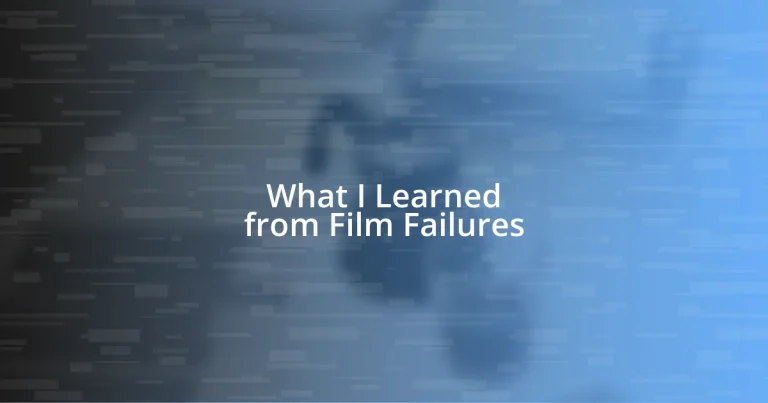Key takeaways:
- Film failures often stem from poor script execution, misaligned marketing, and poor timing, highlighting the importance of alignment between storytelling and audience expectations.
- Engaging with audience feedback can enhance narrative choices and foster emotional connections, turning criticism into a tool for growth.
- Successful comebacks in filmmaking often result from reflection, persistence, and vulnerability, showcasing the importance of learning from failures and adapting creatively.
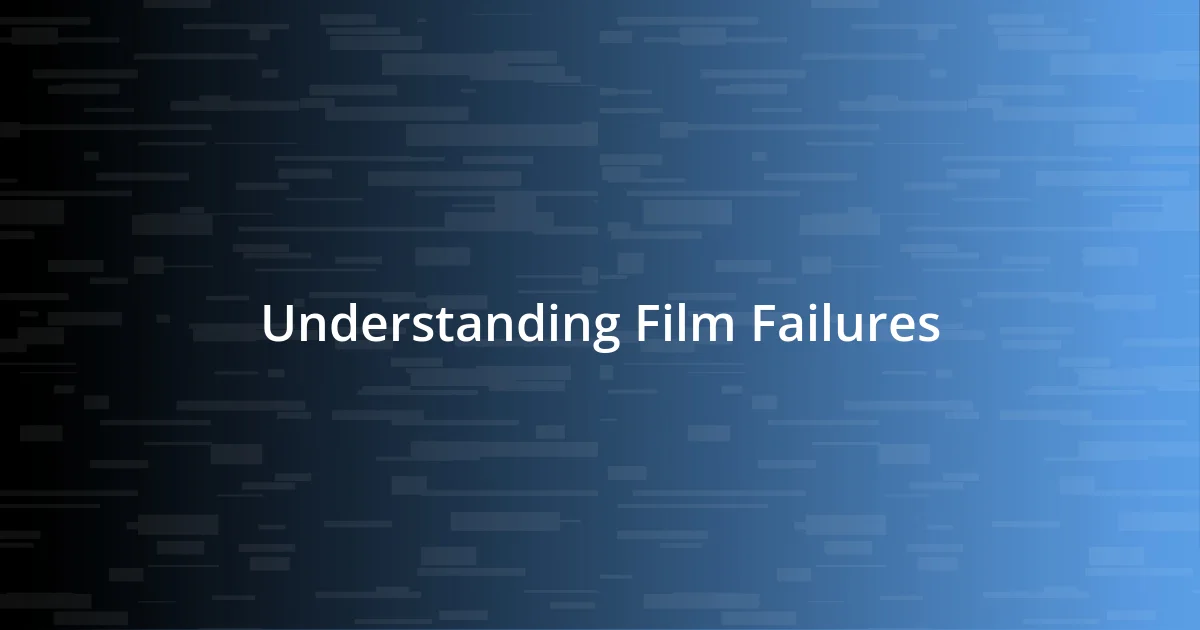
Understanding Film Failures
Understanding film failures requires a nuanced look at the creative process. I remember the feeling of disappointment when a movie I had high hopes for fell flat—like expecting a great meal only to find it undercooked. Why do some films that seem promising from the outset struggle to connect with audiences?
It’s often about more than just the story or the actors; it’s about how everything aligns. When I think of failures, I consider the marketing angle too—did the promotional material set the right expectations? I once saw a trailer that seemed vibrant and engaging, but the film itself lacked the excitement promised. That disconnect can be jarring, and it’s a painful lesson for filmmakers and fans alike.
Moreover, timing plays a crucial role. I’ve noticed how some films release during crowded seasons and get overshadowed by more prominent blockbusters. There was a small indie project I rooted for that didn’t get the recognition it deserved simply because it came out the same week as a major franchise installment. It makes you wonder: what might have happened if it had found its moment to shine? Understanding these dynamics helps us appreciate the complexity behind film failures.
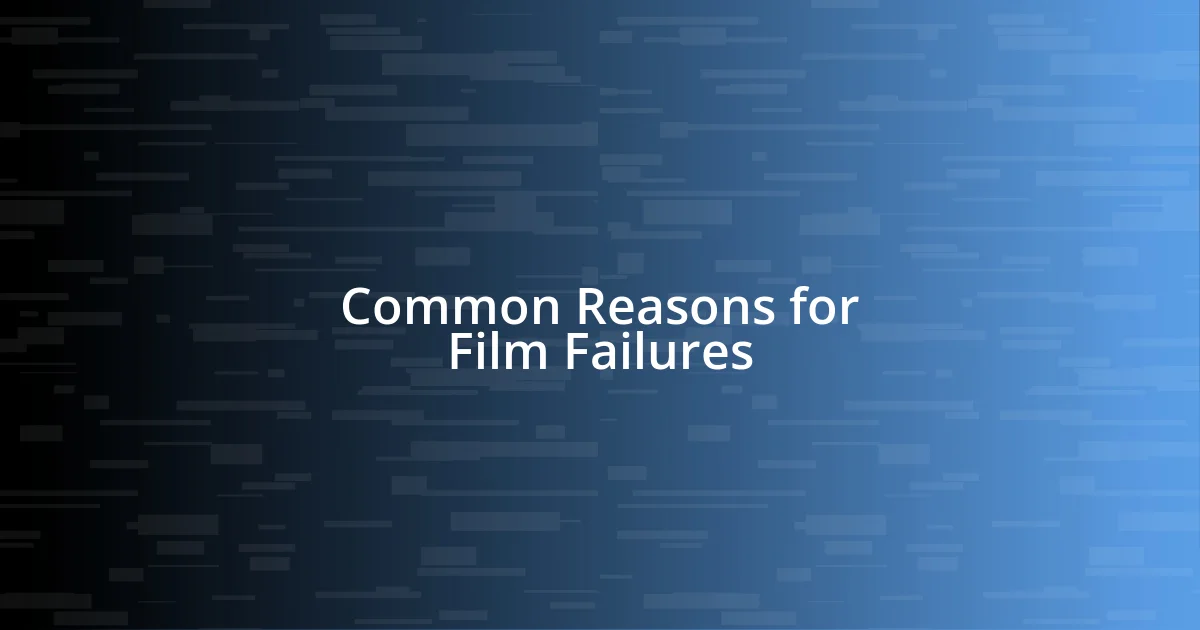
Common Reasons for Film Failures
It’s fascinating to dissect why certain films crash and burn despite potential promise. One major reason I’ve witnessed is poor script execution. I remember watching a highly anticipated film that had a stellar cast, but the dialogue felt forced and the pacing dragged. It’s like trying to enjoy a concert where the musicians just can’t find their rhythm; you want to love it, but the experience leaves you flat.
Here are some common reasons for film failures:
- Weak Script: A compelling story is the backbone of any film; if this isn’t strong, everything else falls apart.
- Misaligned Marketing: Sometimes, the trailers promise an epic adventure, yet the final product doesn’t deliver.
- Casting Choices: In some instances, actors might not embody their roles effectively, leaving audiences feeling detached.
- Poor Timing: Films can be overshadowed by other releases, similar to how a small flower might wilt under the shadow of a giant tree.
- Budget Constraints: Inadequate funding can lead to poor production quality, which can alienate viewers.
Navigating the film industry can be tricky, and even established names can falter. I recall a well-known director’s film that, despite significant hype, ended up feeling disconnected from its audience. It’s a stark reminder that even the best intentions don’t always translate into success. Each failure serves as a valuable lesson, both for filmmakers and for us as viewers looking to understand the intricacies of storytelling.
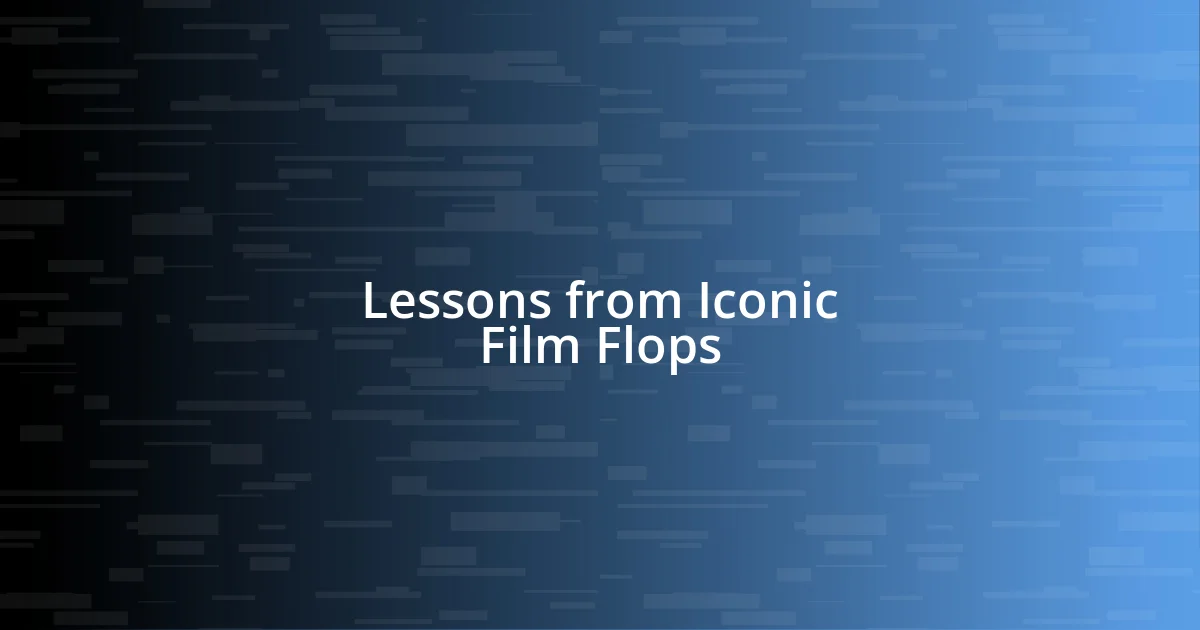
Lessons from Iconic Film Flops
When examining iconic film flops, it’s crucial to reflect on the valuable lessons they offer. One film that comes to mind is “Waterworld.” I remember the buzz surrounding its release, fueled by hefty production costs and ambitious storytelling. Unfortunately, audiences found it lacking, and it became infamous for its failures. The lesson here is clear: innovation must be balanced with execution. Just having a grand vision isn’t enough without the supporting structure to bring it to life.
Another classic example is “The Adventures of Pluto Nash.” It was disheartening to watch a film filled with potential flop so drastically. I still remember the confusion of my friends and me, trying to figure out why a well-known actor like Eddie Murphy could miss the mark so spectacularly. It highlighted a fundamental truth: strong star power does not automatically equal a well-received film. The mix of a misaligned concept and unoriginal humor can lead even the biggest names astray.
These experiences show that audience expectations and creative choices must align. I think about what went wrong in these films, and it reinforces the idea that, at the end of the day, storytelling deserves thoughtful consideration over flashy marketing or big names alone.
| Film Title | Key Lesson |
|---|---|
| Waterworld | Execution is essential even with visionary ideas. |
| The Adventures of Pluto Nash | Star power doesn’t guarantee success; execution and originality matter. |
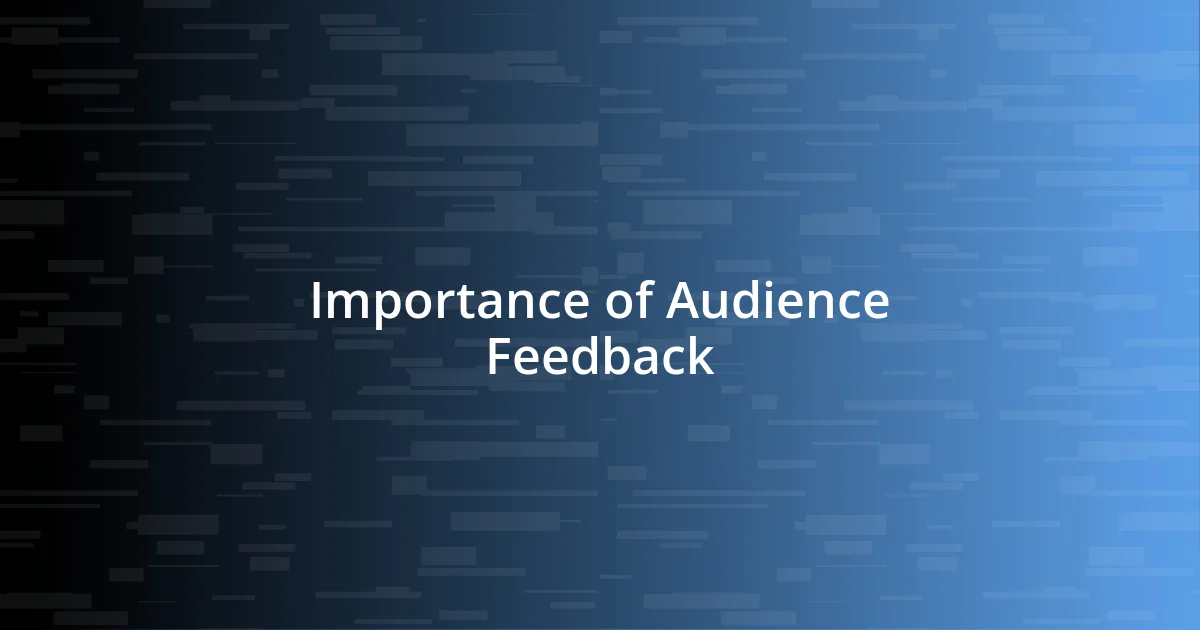
Importance of Audience Feedback
Understanding what audiences think is crucial for a film’s success. I recall a friend who walked out of a movie, citing it as “emotionally hollow.” The insights shared by viewers can illuminate what works and what doesn’t, highlighting weak points that might not be apparent during production. What if filmmakers engaged with audience feedback earlier in the process? Their narrative choices might not only improve but resonate more profoundly with viewers.
Audience feedback can serve as a compass for filmmakers navigating the sometimes murky waters of storytelling. I remember producing a short film and, after a rough cut, gathered a small group for screening. Their reactions were eye-opening; they pointed out plot holes I hadn’t noticed. It made me realize how invaluable fresh perspectives can be in refining a story. When creators listen to their audience, they can create a stronger emotional connection, transforming feedback into a powerful tool for growth.
The film industry thrives on the relationship between creators and viewers. I’m often struck by how many filmmakers choose to ignore criticism or feedback. It’s tempting to become defensive when you’ve poured your heart into a project. However, embracing constructive criticism leads to improvement. I often wonder: isn’t it better to adapt and grow than to cling to something that may not resonate? Engaging with your audience can not only shape a better film but can also build a community that feels invested in your work.
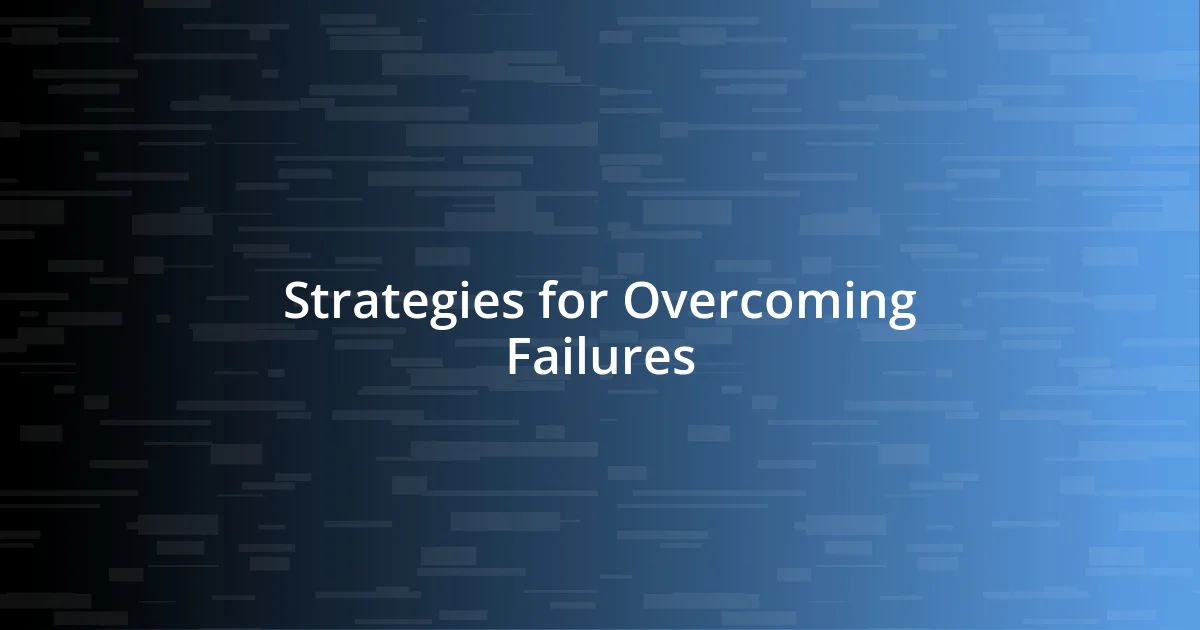
Strategies for Overcoming Failures
Strategies for overcoming failures in filmmaking often require embracing a mindset of resilience and adaptability. I remember a time when I was part of a team tasked with shooting a documentary that didn’t quite match our expectations. Rather than sulking over the shortcomings, we rallied together and evaluated our process, which revealed opportunities for growth. Have you ever found that some of your greatest insights come from digging into your mistakes?
Another effective strategy is fostering a culture of experimentation. I’ve seen filmmakers who dared to break conventions and take risks with their narratives or filming techniques. This approach can lead to unexpected successes or, at the very least, valuable lessons. I once attended a workshop where participants were challenged to create short films within strict guidelines—failure was the goal! The results were often surprising, and it taught me that pushing boundaries can yield delightful, albeit imperfect, creativity.
Finally, building a strong support network can be a game changer. Engaging with fellow creatives offers perspectives that can illuminate blind spots. I often chat with colleagues about their setbacks and triumphs, and it genuinely helps to normalize the experience of failure. Have you ever shared a tough moment with a friend only to find solidarity in their similar stories? It’s through these collaborations and conversations that we can cultivate resilience and transform failure into a stepping stone for future projects.
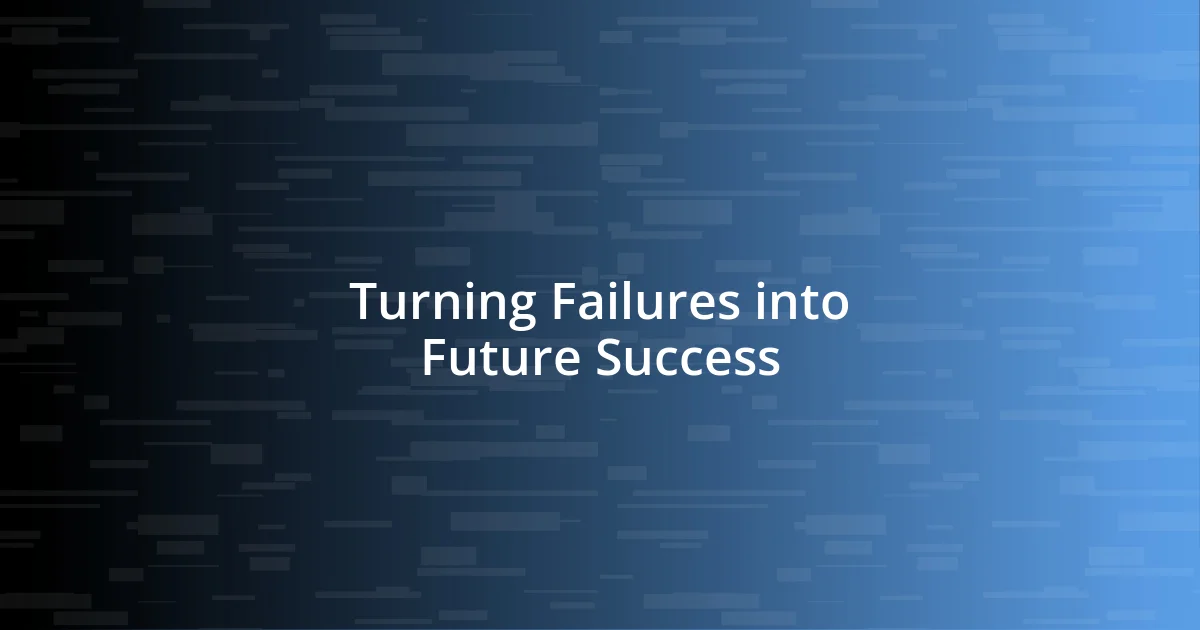
Turning Failures into Future Success
In turning failures into future successes, I’ve learned that reflection is key. After working on a film that bombed with critics, I took a step back and really asked myself, “What could I have done differently?” This introspection revealed that while the script had potential, it lacked depth in character development. Embracing that insight allowed me to approach future projects with a stronger focus on creating compelling characters who resonate with audiences.
One of my most profound realizations came when I faced what felt like a catastrophic setback. During post-production of my short film, a critical editing mistake led to a confusing final product. Initially, I viewed it as a disaster, but after sharing it with a mentor, I discovered that this misstep highlighted an entirely new direction I hadn’t considered. “What if this failure is just the beginning?” I thought. It was then that I recommitted to learning from every hiccup and embraced each setback as an opportunity to innovate.
Failure in filmmaking can feel isolating, but I’ve found that connecting with others transforms that experience. I vividly remember discussing a particularly painful rejection with a fellow filmmaker, who then shared her own stories of near-misses. Hearing her journey made me reflect on the fact that growth often comes from the hard lessons. “What if I shifted my perspective?” I asked myself. By approaching failure as a shared experience rather than a personal defeat, I fostered resilience and equipped myself to tackle future projects with renewed vigor and creativity.

Case Studies of Successful Comebacks
One remarkable comeback I witnessed was with a director I had admired for years. After a highly publicized flop, everyone thought his career was over. Instead of retreating, he took a long break to reflect and came back with a genre-bending film that captivated both critics and audiences alike. How often do we underestimate the power of stepping back to reassess our creative direction? This director’s journey reminds me that sometimes taking space is what we truly need to unlock our potential.
Another case that stands out is a small indie film that struggled to find its audience. The initial release was met with lukewarm responses, but the filmmakers didn’t throw in the towel. They used feedback to re-edit the film and re-released it at festivals, where it slowly built a passionate following. Seeing that shift, I couldn’t help but ask: what can we learn from this persistence? It’s a powerful reminder that initial failure doesn’t define our work; it’s our response that can rewrite the narrative.
I recall a colleague who ventured into a passion project that fell flat commercially. Instead of fading away, she utilized social media to connect directly with her fans, sharing her candid feelings of disappointment. This honesty resonated with many, leading to a renewed interest in her work and ultimately a successful campaign for her next film. Have you ever considered that vulnerability might be your strongest ally? It’s incredible how embracing our setbacks can often pave the way for redemption and connection with others who have faced similar challenges.












